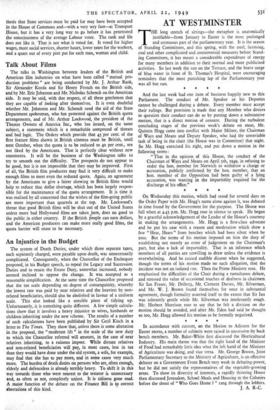AT WESTMINSTER
THE long stretch of sittings—the metaphor is anatomically justifiable—from January to Easter is the most prolonged and strenuous part of the parliamentary year. It is the season of Standing Committees, and this spring, with the steel, licensing, coal and other complicated and controversial measures before Stand- ing Committees, it has meant a considerable expenditure of energy
for many members in addition to their normal and more publicised activities. So last week the sun on the Terrace, and the brave surge of blue water in front of St. Thomas's Hospital, were encouraging reminders that the most punishing lap of the Parliamentary year was all but run. * * * * And the last week had one item of business happily new to this Parliament. The conduct of Mr. Speaker or his Deputies cannot be challenged during a debate. Every member must accept their rulings. But provision is made that any Member who desires to question their conduct can do so by putting down a substantive motion, that is a direct motion of censure. During the turbulent concluding stages of the previous week's debate on meat, Mr. Quintin Hogg came into conflict with Major Milner, the Chairman of Ways and Means and Deputy Speaker, who had the unenviable task of being in the chair (the House was in Committee) that night.
So Mr. Hogg exercised his right, and put down a motion in the following terms: " That in the opinion of this House, the conduct of the Chairman of Ways and Means on April 5th, 5949, in refusing to order the hon. member for Norwich to withdraw a charge or accusation, publicly confirmed by the hon. member, that an hon. member of the Opposition had been guilty of a lying accusation, was wanting in the impartiality required for the discharge of his office."
* * * * On Wednesday this motion, which had stood for several days on the Order Paper with Mr. Hogg's name alone against it, was debated in time found by the Government for the-purpose. The House was full when at 4.43 p.m. Mr. Hogg rose in silence to speak. He began by a graceful acknowledgement of the Leader of the House's courtesy in making the arrangements. Mr. Hogg is a first-class advocate and he put his case with a reason and moderation which drew a few " Hear, Hears " from benches which had been silent when he rose. But the terms of his motion imposed on him the duty of establishing not merely an error of judgement on the Chairman's part, but also a lack of impartiality. That is an inference which members of all parties are unwilling to draw unless the evidence is overwhelming. And he caused audible dissent when he suggested, though the terms of his motion made no such allegation, that the incident was not an isolated one. Then the Prime Minister rose. He emphasised the difficulties of the Chair during a tumultuous debate, and stressed the value of occasional touches of deafness in chairmen. Sir Ian Fraser, Mr. Driberg, Mr. Clement Davies, Mr. Silverman, and Mr. W. J. Brown found themselves for once in substantial agreement, though formality asserted itself to the extent that Sir Ian was tolerantly gentle while Mr. Silverman was intolerantly rough. Mr. Herbert Morrison rose to say that he felt a division on the motion should be avoided, and after Mr. Eden had said he thought so too, Mr. Hogg allowed his motion to be formally negatived.
* * * * In accordance with custom, on the Motion to Adjourn for the Easter recess, a number of subjects were raised in succession by back bench members. Mr. Baker-White first discussed the Horticultural Industry. His main theme was that the right hand of the Minister of Food had remarkably little idea what the left hand of the Minister of Agriculture was doing, and vice versa. Mr. George Brown, Joint Parliamentary Secretary to the Ministry of Agriculture, is an effective debater on a Government Front Bench very weak in debating-power, but he did not satisfy the representatives of the vegetable-growing areas. To show its diversity of interests, a rapidly thinning House then discussed Jerusalem, School Meals and Housing in the Colonies before the shout of " Who Goes Home ? " rang through the lobbies.
J. A. B.-C.


































 Previous page
Previous page